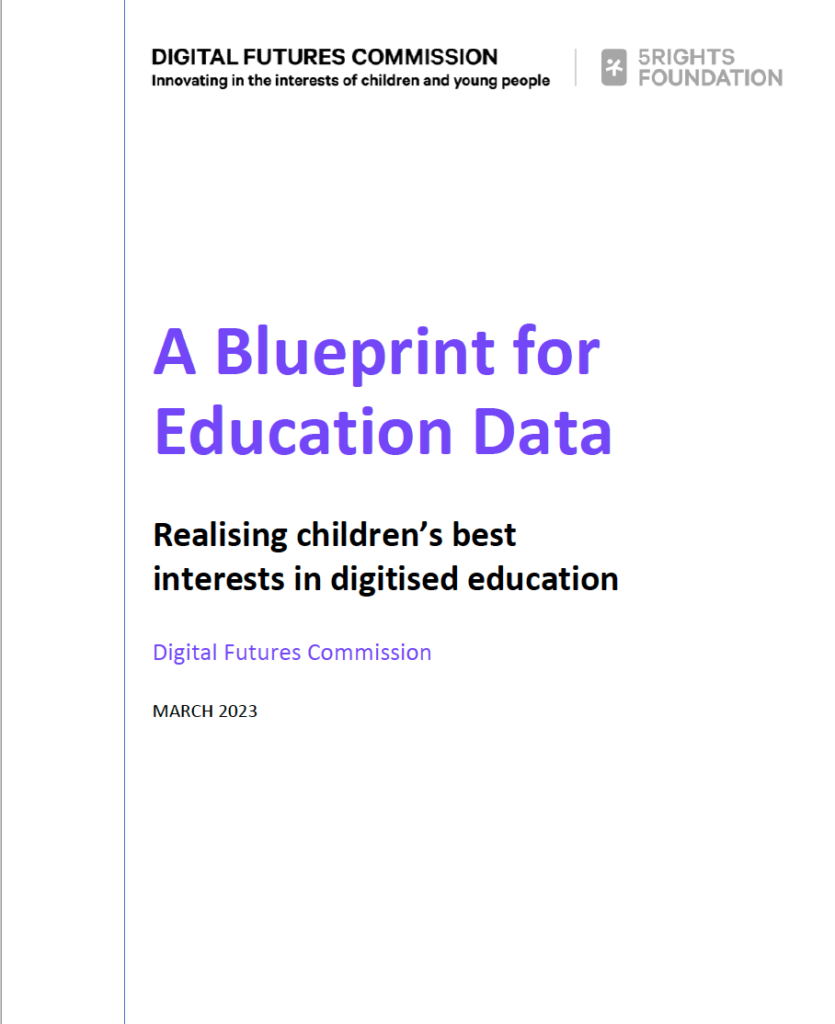Today, the Digital Futures Commission launches “Blueprint for Education Data: Realising children’s best interests in digitised education”, a practical framework designed to tackle EdTech companies violating children’s privacy while learning at school. Backed by experts across the country, the Blueprint lays out baselines for how Government, EdTech companies and regulators can advance children’s best interests and realise the vast positive potential that lies within technology-assisted education practices.

The Digital Futures Commission, backed by experts and practitioners from the fields of education, technology, and data governance, is issuing a stark warning to both Government and the wider EdTech sector to end practices that exploit their data for commercial gains. Recent data breaches, where children’s data was made available to gambling firms or exploited for commercial gains by EdTech providers, show children are at risk while at school. The Covid-19 pandemic provoked a surge in the uptake of EdTech within education, which is expected to grow, including through the Department for Education’s agenda for ‘Blended Learning’. The wider sector is valued at US$187 billion and is expected to reach US$230 billion by 2028.
“There is a confused landscape in which schools are given responsibility for processes that are controlled by commercial companies, and children are given no choice over their personal data making frequent scandal and commercial exploitation of children’s personal data the norm. Sadly, this parlous state also means we fail to have an exciting vision for how education data could be used to enhance education in children’s best interests.”
Baroness Beeban Kidron OBE, the Founder and Chair of 5Rights Foundation, which hosts the Digital Futures Commission
Last year the Digital Futures Commission (DFC), hosted within children’s rights organisation 5Rights Foundation, conducted a nationally representative survey of UK pupils, showing that:
- 33% had been asked by their school to use either Google Classroom or Microsoft Teams in the past year, while 18% had been asked to use ClassDojo
- Less than one third of children reported that their school had told them why it uses EdTech, and fewer had been told what happens to their data or about their data subject rights.
- Fewer than one in ten children thought it acceptable for the apps they use at school “to share information about you and your classmates with other companies.” Even fewer thought this acceptable for sensitive data.
The Blueprint sets out three priorities for decision makers:
- Enforce existing regulations (such as the Age-Appropriate Design Code) and bring in new regulations where needed to keep pace with EdTech development;
- Introduce a certification process for EdTech providers before they are allowed to be used in a school setting;
- Harness the positive potential of EdTech by creating a trusted data-sharing infrastructure to serve children’s and the wider education sector’s interests.
The DFC and wider education sector recognise the vast potential that lies in EdTech when data is shared in a privacy-preserving way. Insights from aggregated and anonymised data can empower educators to make targeted interventions before underperforming pupils fall behind and give students access to personalised learning experiences for better educational outcomes.
“At present, EdTech companies profit from collecting children’s data while they learn, yet remarkably little of that data is shared in children’s or the public’s best interest. The Digital Futures Commission’s Blueprint on Education Data corrects this imbalance so that data collected from children benefit them now and in the future.”
Professor Sonia Livingstone OBE, London School of Economics and Political Science
For more information on the Blueprint for Education Data and to download a copy, please visit https://digitalfuturescommission.org.uk.